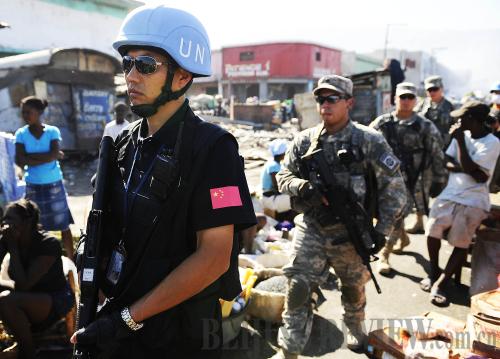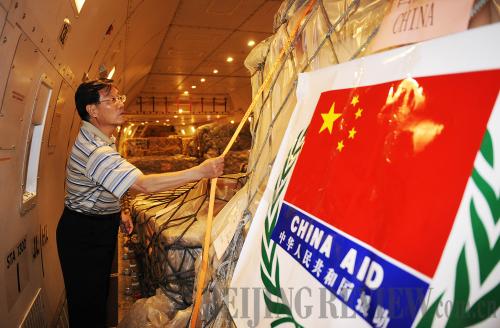|
In addition, Wu said, international disaster relief missions should work with each other effectively. Coordination between the UN, which oversees peacekeeping operations in Haiti, and the United States, a major provider of assistance, should in particular be enhanced.
Between the moments when the 7.3-magnitude earthquake practically leveled many of Haiti's most populated areas on January 12 and early February, 67 international rescue teams were working around the clock in Haiti, according to the UN.
Continued support
China, of course, has risen to the occasion, too. In all, Beijing has provided 48 million yuan ($7.1 million) in materials and medical services, as well as $3.6 million in cash to Haiti, according to the Chinese Foreign Ministry.
A second shipment of Chinese goods arrived at the Port-au-Prince Airport on January 26. The 65 tons of supplies included portable power generators, water purification devices, tents, clothes and medicine. The third shipment, consisting of 25 tons of medical aid, reached Haiti on February 8.
A 40-member medical and epidemic-prevention team, meanwhile, was dispatched to Haiti. Their deployment was meant to relieve a Chinese search and rescue team, which had been operating in Haiti since January 14 and was one of the very first international rescue teams to arrive in Port-au-Prince after the earthquake.
Each of the Chinese doctors on the team had participated in the rescue mission in the wake of the Wenchuan earthquake. During their two-week stay in Haiti from January 25 to February 8, they treated about 4,000 Haitian patients, while training volunteers in preparing drugs and conducting sterilization.
As a part of the training, the volunteers were schooled in methods to control the spread of epidemics on their own after Chinese doctors' departure, Yang Zhengzhou, an epidemic specialist on the team, told Xinhua News Agency.
In addition to medical workers, China has deployed four more peacekeeping police officers to Haiti. Among the eight Chinese police officers killed in the earthquake, four were members of the Chinese peacekeeping police force in Haiti.
Apart from maintaining public security, Chinese peacekeeping police officers play a critical role in rescue and relief operations, said Edmond Mulet, the interim head of the UN Stabilization Mission in Haiti, in an interview with Xinhua News Agency.
"My impression of the Chinese peacekeepers is that they are a professional, highly efficient, fast-responding and multi-functioning team," he said. They are, he said, "an important force" to maintain the situation in Haiti and especially in Port-au-Prince.
China, as a permanent member of the UN Security Council, "was the first to propose increasing the capacity of the UN in Haiti's reconstruction," he said, noting that he believes the move demonstrated China's political support for the world body.
This was underscored by the fact that, on January 19, the UN Security Council adopted a resolution under which it would send an additional 3,500 peacekeepers—including 1,500 police officers and 2,000 military personnel—to Haiti.
Solid planning
Jiang Shixue, a Latin American affairs expert with the Chinese Academy of Social Sciences, believes the UN should play an important role in coordinating international assistance efforts.
"Haiti should devise an overall plan covering issues ranging from potential fund contributors to building material suppliers," he said, "so that it can make the most of the different kinds of international assistance in its reconstruction."
 |
|
WALKING THE WALK: A member of the Chinese anti-riot peacekeeping police team in Haiti participates in street patrols in Port-au-Prince alongside U.S. soldiers on January 28 (WU XIAOLING) |
China, which is experienced in dealing with post-quake relief because of the Wenchuan tragedy, can "provide leadership and guidance for the international community in responding to the current crisis in Haiti," said Khalid Malik, UN Resident Coordinator and UN Development Program (UNDP) Resident Representative in China.
"The generous contributions of the private sector to the quake-affected communities in Sichuan set an example for what must be carried out in Haiti," he said at a press conference on February 2. "The resources and capacities of the private sector are absolutely critical in relief and reconstruction efforts of this magnitude."
But in addition to death, injury and destruction, earthquakes can often leave behind something else—a phenomenon which victims in Sichuan are all familiar with.
Based on China's experience, UNDP Country Director in China Subinay Nandy said psychological treatment for earthquake victims in Haiti will continue to be in great demand in the coming months.
 |
|
A TIME FOR GIVING: Wang Shuping, a staff member of China's Commercial Development Bureau in Haiti, checks earthquake relief supplies from China at the Port-au-Prince airport on January 26 (WU XIAOLING) |
Other needs must be filled too, according to development experts. The UNDP, for example, has launched a "cash-for-work" program in Haiti, which is expected to create up to 220,000 temporary job opportunities while benefiting more than 1 million people.
In the end, Haiti's development and reconstruction will depend on the will of its people and the help of the international community, Jiang said.
What the international community can provide at a premium are medical services and reconstruction of infrastructure such as houses and roads, he said. After that, Jiang added, the UN could send some experts to Haiti to help the Haitian Government formulate economic policies to attract foreign investment and preclude a national "brain drain."
Of course, not all of China's successful practices will work in Haiti. For instance, Haiti will not be able to duplicate China's "counterpart assistance" mechanism, Jiang said.
In an effort to speed the reconstruction process following the Wenchuan earthquake, the Chinese Government paired eastern provinces and cities with earthquake-ravaged localities into partners and tasked them with assisting their respective partners. | 